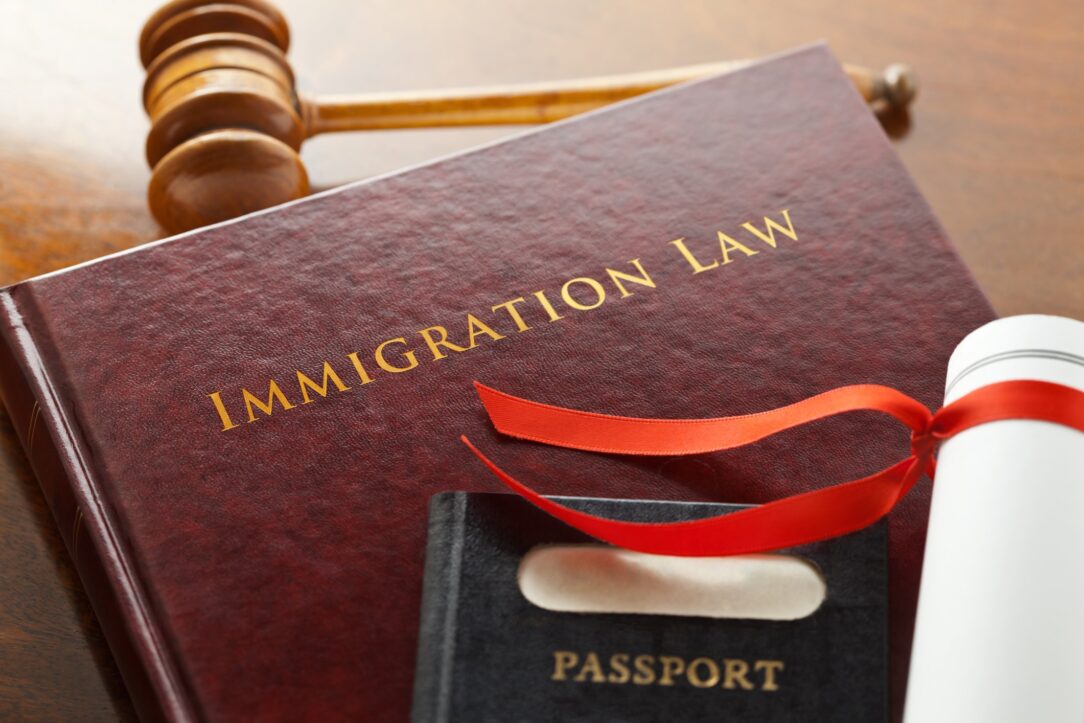
Why hire a lawyer when there is lower-cost help available through immigration consultants and online immigration services? Do you really need a lawyer when you could fill out the forms and follow the instructions yourself?
The reasons are many, from ensuring you fully understand the process to avoiding unnecessary delays.
The main advantages of hiring a trusted immigration lawyer, instead of depending on an immigration consultant or online immigration service or working on the case yourself are:
1. You receive guidance on which forms and documents to submit
A lawyer is not required to fill out application forms for immigration benefits. Anyone can complete the forms, which are, along with the instructions, available for free on U.S. Citizenship & Immigration Services and the U.S. Department of State’s websites.
But U.S. government agencies are not your advocates and do not consider your individual situation when providing resources and information to you. Only an immigration lawyer, who truly understands the eligibility requirements, can give you the most reliable advice on which forms and documents to submit to receive immigration benefits.
Legitimate immigration consultants and online immigration processors can certainly help you complete forms and submit the paperwork to USCIS and DOS at a much lower cost than what lawyers charge.
Nevertheless, your knowing which forms and documents to submit is not always clear by just reading instructions or doing your own research. Immigration consultants and online immigration services are prohibited from giving any legal advice concerning your immigration case, including which forms and documents to submit. Rather, you yourself have to make this determination before they then fill out the forms with your answers and prepare the documents you have given them for filing with the appropriate U.S. government agency.
Even qualified immigration consultants and highly-rated online immigration services are just document preparers. While they are distinguishable from shady Notarios who prey on vulnerable immigrant groups and engage in immigration scams, they provide limited service that does not always meet your immigration needs.
Questions on applications forms and questions from immigration or consular officers might seem simple, but often relate to legal issues that can result in denials and setbacks in your case. Immigration consultants and online immigration processors cannot counsel you on how to best answer a question or cross-check or verify your answers on the forms. All they can do is replicate and type out your responses to the questions asked on the forms.
When non-lawyer immigration consultants or online immigration processors advise you on which immigration benefit to apply for and how to prove you qualify for it, they essentially engage in unauthorized practice of law.
In contrast, immigration lawyers advise you on which exact forms and documents to submit for a particular immigration benefit. They will cross check your answers on application forms with your biographic and immigration records to help ensure accuracy and completeness. They will also counsel you on the implications of your answers to questions, as well as the effects of providing or not providing certain documents.
2. You get legal advice on how to best present your case
A good lawyer will counsel you on eligibility standards and evidentiary requirements, including those that are not spelled out in the instructions for forms or are otherwise readily known.
For instance, while an immigration consultant or online immigration service will accept your marriage certificate and divorce decrees for prior marriages as sufficient in an I-130 spousal immigrant petition, a lawyer will counsel you on additional documents to submit to prove your marriage is valid and bona fide.
A lawyer might be unnecessary in very simple cases, where the bare minimum is all that’s required to get the case approved. But in many cases, a high volume of documentary evidence, as well as credible testimony, are needed to achieve a favorable outcome.
One of the fastest growing online immigration processors, RapidVisa, states specifically that it does not give legal advice or representation, but offers a service similar to TurboTax for visa applications. At a low price, they provide online processing of K-1 fiancée visas, spousal visas, parent visas, green cards (adjustment of status), removal of conditions, citizenship (naturalization), joint sponsorship, and deferred action (Deferred Action for Childhood Arrival, under President Obama).
RapidVisa boasts an approval rate of 99.7% and 4-hour turnaround time. But it’s fair to say that these cases most likely had no complications to require the work of a lawyer, and could have been handled just as well by an applicant who was willing and able to deal with the paperwork alone.
Reputable immigration lawyers, who have the expertise to deal with the worst types of cases, are best equipped to help you present the strongest case possible. They can steer you away from pitfalls that lead to complications in your case, such as USCIS issuing a Request for Evidence or a Notice of Intent to Deny Petition. They are trained to spot issues and weaknesses that can tank your case. Unlike immigration consultants and online immigration processors, they do not merely rely on generic templates and checklists that do not account for unique situations.
3. You obtain verification on whether you actually qualify for the benefit sought
An immigration lawyer will gather facts and review your record to confirm whether you are eligible for the immigration benefit you seek. For example, under current law, you cannot apply for a marriage-based green card within the U.S. if you were not lawfully admitted to the U.S. with inspection, and you do not qualify for 245(i) benefits. If your immigrant petition is not in the immediate relative category, you may not file for adjustment to permanent residence unless you are maintaining lawful nonimmigrant status after entry as an F-1 student, H-1B worker, etc. or certain narrow exceptions apply.
Immigration consultants and online immigration processors are not equipped or authorized to verify your eligibility for a benefit sought. They cannot give advice as to which immigration status you should seek. These are legal issues that requires a lawyer’s guidance, especially when there are complications in your case.
Complications include previous marriage(s)/divorce(s), a history of visa denials, visa overstays, unlawful presence, prior removal orders, illegal entries and re-entries to the U.S., immigration fraud or willful misrepresentation, false claims to U.S. citizenship, a criminal record, and being from a high-fraud country.
In June 2016, the State of Colorado passed a law that forced RapidVisa to relocate out of Colorado Springs, Colorado to Las Vegas, Nevada, where regulations related to the document-preparation industry are favorable. Known as Immigration Consultants Deceptive Trade Practice, the Colorado law targets deceptive “notarios”, which are small operations common in Hispanic communities, but it further forbids any person from offering any immigration service, regardless of whether it involves practicing law, unless that person is a lawyer.
In a press release, Ben Ives, President of RapidVisa, stated “this was simply a case of lawyers protecting their income.” He noted, “Petitioning for a family visa is a benefit request, not a legal issue. Do you hire a lawyer to apply for your driver’s license?”
Contrary to Mr. Ives’ claim, applying for an immigration benefit involves many legal issues that determine whether a person can live, study or work in the U.S., and even visit the country. Filing for an immigration benefit has a much more serious and broader impact than applying for a driver’s license.
A U.S. citizen’s decision to bring a fiancée, spouse, or parent to the U.S. , for example, affects the fate of the family and their reunification. An applicant’s mistake in filing for an immigration benefit, such as a green card or citizenship, for which he does not qualify can sometimes lead him into removal proceedings and get him deported from the United States.
4. You have comprehensive counseling from start to finish
In the initial evaluation of your case, and during the course of representation, an immigration lawyer can identify your priorities and pinpoint issues to help you achieve your objectives. They can lay out your various options and describe the pros and cons of pursuing each path.
An immigration lawyer can guide you on how to avoid complications or address them as they arise, such as responding to a Request for Evidence, a Notice of Intent to Deny, a Notice of Intent to Revoke, an inadmissibility finding, or a denial decision. He or she can intervene on your behalf to resolve problems.
An immigration lawyer can also prepare you for interviews before USCIS and the U.S. Consulates by describing what questions to expect and which issues are likely to arise. Although they should not “coach” you on what to say, they may advise you on how to best present both positive and negative information.
A lawyer may appear with you at green card interviews and naturalization interviews to help protect your rights, present documentary information, and ask clarifying questions. They can further prepare and submit a legal brief to stave off concerns and persuade the officer to approve your case.
Lawyers must keep up with changes in the law, the risks (not just the benefits) of applying for immigration relief, and the nuances in the immigration process, and advise you accordingly.
A non-lawyer immigration consultant or online immigration processor cannot perform these vital services.
5. You get legal help from a licensed professional who is held to the highest ethical standards
When an immigration consultant or online immigration processor overlooks critical pieces of information or documents — which results in an avoidable revocation process, denial or delay — there is generally no recourse. You typically have to rectify the harm through their channels or file a consumer complaint with the state attorney general.
Lawyers, on the other hand, are held to ethical standards in their state rules of professional conduct. They can face disciplinary action, such as a suspension or disbarment, for failing to perform duties owed to clients. As a licensed professional, a lawyer has obligations and responsibilities that go above and beyond those of a non-lawyer immigration service.
Consult an immigration attorney at the very least
Some states, such as California, Minnesota, and New York regulate the conduct of immigration consultants, instead of forbid them from performing any immigration service. While they may provide document preparation, they cannot offer legal advice in any situation.
Legitimate immigration consultants and online immigration processors can ease the stress that comes with handling the immigration paperwork yourself. But realize they do nothing more than document preparation. A complete reliance on non-lawyer immigration services gives you a false sense of security and could open you up to making mistakes and bungling your immigration matter.
Reliable legal representation may be more affordable than you assume. There are solo practitioners and small firm lawyers who charge reasonable fees for high-quality, comprehensive service. There are also non-profit legal service providers and pro-bono attorneys who will accept your case for sliding scale or reduced fees or no fees.
Almost everyone can gather funds to consult an experienced immigration lawyer at least once, or retain unbundled legal service to address the complicated parts of the case. Before you file for an immigration benefit, talk to a reputable immigration lawyer about the eligibility standards, documentary requirements and filing process. Relying on immigration consultants and online immigration processors can save you money upfront, but cost you a lot more in the long run.
This article provides general information only. It is based on law, regulations and policy that are subject to change. Do not consider it as legal advice for any individual case or situation. Each legal case is different and case examples do not constitute a prediction or guarantee of success or failure in any other case. The sharing or receipt of this information does not create an attorney-client relationship.





















